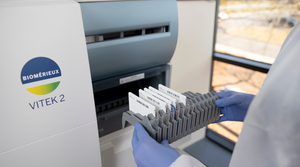CareFusion To Shell Out $500M To Buy Vital Signs Business From GE
November 18, 2013

One person's trash is another's treasure.
That appears to be the case with a new M&A announcement. San Diego-based medtech company CareFusion announced Monday that it plans to buy the Vital Signs business from GE Healthcare for $500 million.
The Vital Signs business of GE makes single-use disposables for patients in the fields of respiratory care and anesthesiology. According to CareFusion's news release, the business has annual revenue of $250 million. That's quite a bit less than the $860 million GE paid in 2008 to bring Vital Signs under its fold. Five years later, GE is ready to divest it.
"We are confident this transaction will provide Vital Signs new capabilities to maximize its opportunities in the medical consumables space and enable GE Healthcare's Life Care Solutions segment to remain focused on its core strengths as a provider of medical device solutions," said Tom Gentile, president and chief executive officer of GE Healthcare's Healthcare Systems division, in a news release. "We believe CareFusion is equipped to unlock the growth potential of Vital Signs with a solid focus and strategy around medical consumables."
With the acquisition, CareFusion gets access to global markets in China and other countries, while becoming "full-line provider" of more than 20,000 single-use consumables for respiratory care and anesthesiology care that include circuits for oxygen and anesthesia, humidification, masks, filters, pressure infusers and temperature management products.
“The acquisition of Vital Signs is well-aligned to our long-term growth strategy, helping us create scale in our Procedural Solutions call points and increase our presence outside of the United States," said Kieran T. Gallahue, chairman and CEO of CareFusion. "Together, CareFusion and Vital Signs have the R&D, manufacturing and go-to-market resources to drive innovation, invest for growth and better support customers in major geographic markets."
The acquisition is set to close in stages first in the U.S., China and certain other countries by the end of the year, while the remaining transaction will be completed by the end of the first quarter.
[Photo Credit: iStockphoto.com user draco77]
-- By Arundhati Parmar, Senior Editor, MD+DI
[email protected]
You May Also Like

